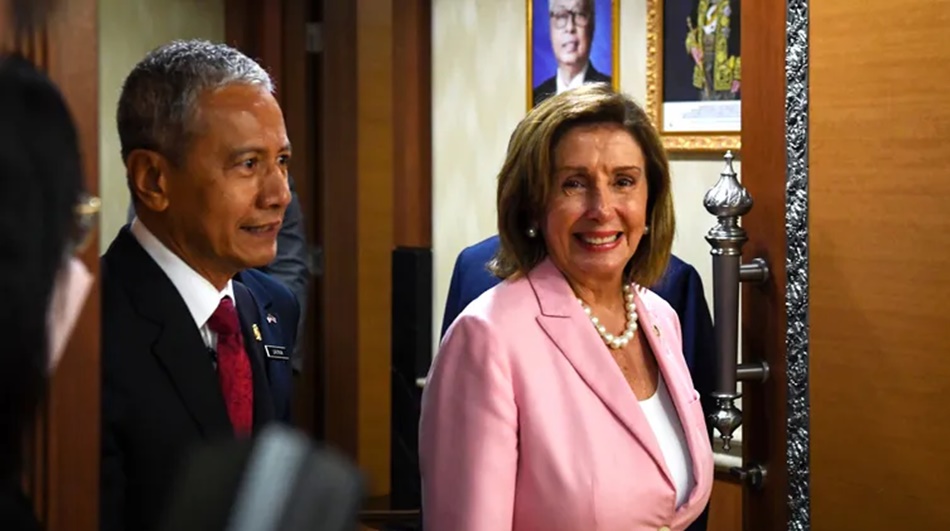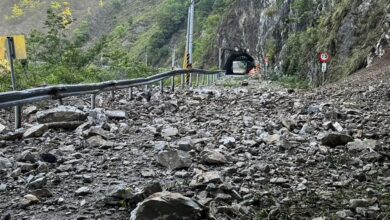
It’s a visit that’s not even fixed. But the mere rumor that Nancy Pelosi wants to travel to Taiwan puts a strain on the tense relationship between the USA and China.
All eyes are on the leading US Democrat and Speaker of the House of Representatives: will she travel to the democratic island republic of Taiwan despite explicit warnings from Beijing – and in the worst case provoke an escalation? Or does she publicly deny the speculation, maybe not go there after all? An overview:
What are Pelosi’s plans?
That is still not certain at the moment, but the indications of a visit are growing: At the beginning of her trip to Asia on Sunday, Pelosi left everyone guessing. Your message only named Singapore, Malaysia, South Korea and Japan as stations. She does not respond to media reports that she also wants to travel to Taiwan, which is what people around her say. “I never talk about my travels because, as some of you know, it’s a safety issue,” she said on Friday in Washington when asked by a journalist. US President Joe Biden also announced that he knew nothing about his party colleague’s travel plans.
In Taiwan, however, there are increasing reports that the top US politician will visit the island: According to local press reports, Pelosi is expected to arrive around 10:30 p.m. local time (4:30 p.m. CEST). According to the broadcaster CNN, the Pentagon is already working on safety precautions if the 82-year-old should really make a stopover in Taiwan. Security has been tightened around the Grand Hyatt Hotel in Taipei, where Pelosi may be staying overnight.
Who could she meet?
A Taiwanese MP confirmed various press reports to the German Press Agency (dpa) in Taipei that Pelosi might arrive in Taipei on Tuesday evening local time from Malaysia. There could be a meeting with President Tsai Ing-wen on Wednesday. According to US media reports, however, the travel plan is in motion, while the Pentagon is monitoring all steps taken by the Chinese side and is working “around the clock” to ensure the security of the number three in the USA – after the president and his vice president – as it is was called.
The US top politician will probably also meet with the vice president of the parliament, Tsai Chi-chang, and members of the legislative council in Taipei, the Taiwanese parliamentarian reported to the dpa. Parliament leader You Shyi-kun was prevented because he was in quarantine after a trip abroad.
What could Pelosi’s visit mean?
In any case, it would be the highest-ranking visit by a US politician to Taiwan in a quarter of a century. With the unannounced visit to Taipei, the top politician would ignore warnings from Beijing, which also threatened possible military countermeasures. The last time a US politician made a comparable visit was when one of Pelosi’s predecessors, Republican Newt Gingrich, arrived on the island in 1997. At that time, shortly before the British colony of Hong Kong was returned to China, the Chinese reaction was moderate, since Gingrich had previously visited Beijing.
Observers speculate that the Democrat Pelosi could take the controversial trip to Taiwan out of her own interest. Because in the USA there are congressional elections in November. The poll numbers of the Democrats are bad, Pelosi could lose her post as majority leader in the House of Representatives. Pelosi has repeatedly positioned herself against China over the course of her career, denouncing human rights violations. Perhaps the 82-year-old could also be concerned with her own political legacy – and not going to Taiwan now because of the pressure from China would certainly scratch that.
Why is the US-China relationship so strained over Taiwan?
The relationship between Beijing, Washington and Taipei is complex. China’s leadership sees free Taiwan as part of the communist People’s Republic and is trying every means to isolate it internationally. The 23 million Taiwanese, on the other hand, have long considered themselves independent. The conflict stems from the civil war in China. At that time, the national Chinese Kuomintang party was defeated and fled to Taiwan with its troops, while the communists founded the People’s Republic in 1949. To this day, Beijing is threatening to conquer Taiwan for “reunification”.
The United States has committed itself to Taiwan’s ability to defend itself – which has so far primarily meant arms deliveries. US President Biden warned China in May of an attack on Taiwan with an unusually clear pledge of military assistance. The US has an “obligation” to defend Taiwan, Biden said. China has no right to take Taiwan by force. In a conversation with head of state and party leader Xi Jinping on Thursday, Biden emphasized that nothing had changed, according to the White House.
Beijing generally refuses to allow representatives of foreign governments and politicians to travel to Taiwan and always refers to its “One China Doctrine”. Accordingly, a country may not maintain diplomatic or other official relations with the island republic if it wants to maintain normal relations with the People’s Republic. In fact, most states do not have an embassy in Taiwan. Like the USA, Germany only has an unofficial representation in the capital, Taipei.
How do the three countries react to the possible visit?
China’s head of state and party leader Xi Jinping warned US President Joe Biden in a telephone call on Thursday before the visit: “Those who play with fire will perish.” Nevertheless, the Chinese Foreign Ministry said on Tuesday that they were in contact with the USA about the possible visit, without giving any further details.
The People’s Republic has so far reacted with several measures: manoeuvres, military movements, closures of sea areas and sudden flight plan changes increased nervousness. To what extent they were directly related to the possible visit to Pelosi remained unclear. Chinese military planes and warships have been sighted near the democratic island republic. In the directly opposite Chinese province of Fujian, the airline Xiamen Airlines surprisingly announced the postponement of 30 flights at the instruction of flight control. Northeast of the southern Chinese island of Hainan, a sea area has been closed for planned military exercises.
The White House, however, warned Beijing of an escalation. “There is no reason for Beijing to turn a potential visit consistent with long-standing US policy into a crisis or conflict,” National Security Council communications director John Kirby said at the White House on Monday. The US would not engage in “saber rattling,” he said. “At the same time, we don’t let ourselves be intimidated.” The US military dispatched four warships, including an aircraft carrier, to the east of Taiwan. However, the US Navy said it was a routine operation.
Even before the visit, the Taiwanese military had increased their combat readiness. The CNA news agency reported, citing a source, that the order came in response to the Chinese People’s Liberation Army threat and its target practice maneuvers. The increased readiness was ordered until Thursday noon. However, the two-stage alarm system is not yet a classification for the “emergency”, but continues to be a “normal operational readiness”.
Would an escalation of the conflict also have an impact on Germany?
In the event of a full-fledged Taiwan crisis or even a war, there would be a lot at stake, not only for Beijing, but also for Germany. The dependence of German companies on China is so great that the economy would be hit hard. Against this background, sanctions against Beijing seem difficult to implement. With its dominance in the production of semiconductors, Taiwan is also a key partner for German industry. A conflict over Taiwan would also be clearly felt in Europe.
Federal Foreign Minister Annalena Baerbock warned of an escalation on Monday. “We do not accept when international law is broken and a larger neighbor attacks its smaller neighbor in violation of international law – and of course that also applies to China,” she said in New York. In view of the “brutal Russian war of aggression” against Ukraine, it is important to make it clear that the international community does not accept such behavior.
How is Russia reacting?
Russia declared its solidarity with China and spoke of a provocation by the USA. “Everything in connection with this tour and the possible visit to Taiwan naturally has a highly provocative note,” said Kremlin spokesman Dmitry Peskov in Moscow on Tuesday, according to the Interfax agency. “We want to emphasize once again that we are in absolute solidarity with China.”
Pelosi: I gave Trump ‘a dose of his own medicine’
CIA anticipates Chinese attack on Taiwan
China’s response to Biden’s threat: US ‘plays with fire’ over Taiwan


